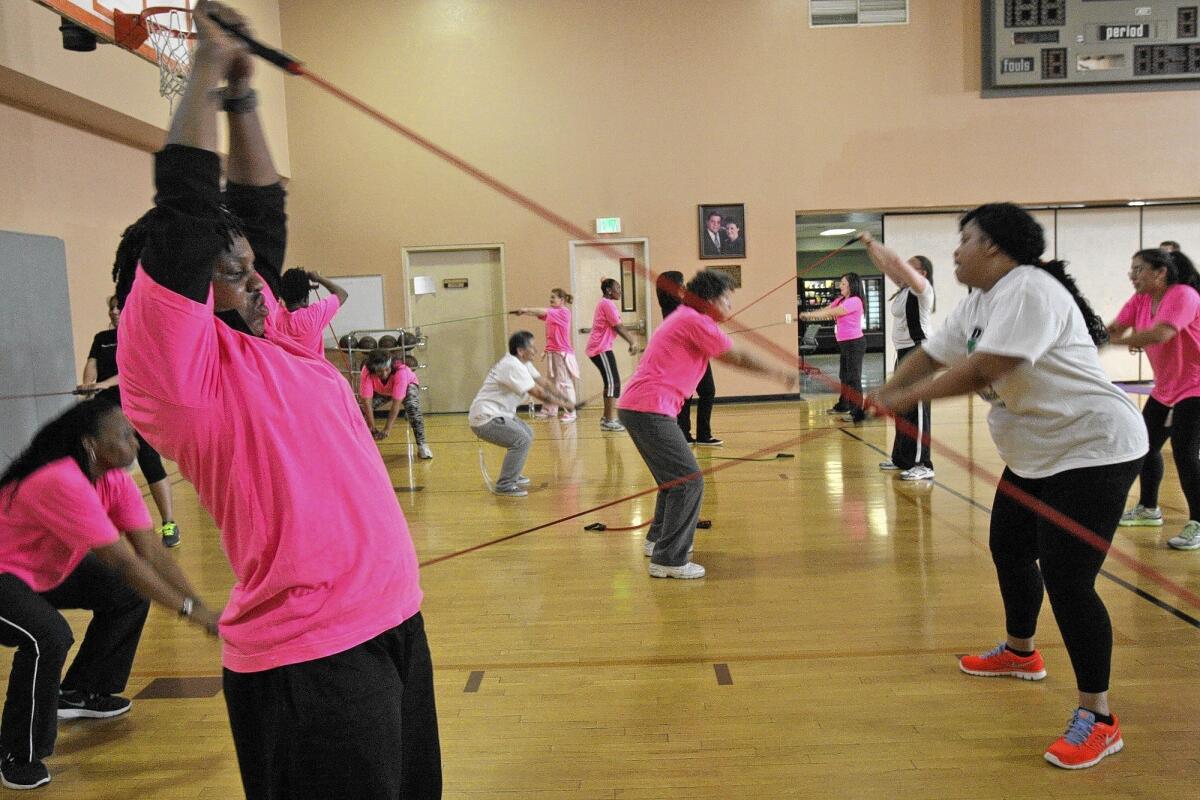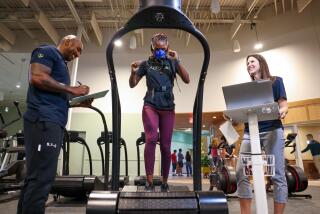Life-coaching on skid row starts with scrapping the textbook

Wendy Newton’s first impulse was to just say no: She wasn’t going to volunteer her life-coaching services to women on skid row.
She has two young children and a “person-centered branding” business with demanding clients. She didn’t want to waste hours in rush hour traffic, crawling from Beverly Hills to downtown Los Angeles every week.
But then she remembered how good it felt when she worked with inner-city teens years before. So she agreed to try skid row.
“I thought, ‘These are grown women. How hard could it be?’”
She found out how hard a few weeks later, when she showed up at the Los Angeles Mission with two other volunteers.
FOR THE RECORD:
Life-coaching on skid row: A column in the April 5 Section A about a life-coaching program for women on skid row misspelled professional life coach Wendy Newman’s last name as Newton.
The professional coaches were accustomed to grateful clients willing to spend thousands for help navigating midlife crises, repairing relationships, building careers.
At the Mission, their sessions drew battle-scarred cynics with criminal records, drug addictions and no regard for the volunteers’ noblesse oblige.
“Some crossed their arms and glared at us from the couch,” Newton recalled. “Others would just get up while we were talking and walk out.”
But the trio of coaches kept showing up — and the cynics came back.
::
The life-coaching sessions are part of a nonprofit project called Urban Fitness 911. Founder Veronica Everett-Boyce began by offering fitness classes last winter in the skid row shelter’s gym.
Her own personal trainer, Nina Moore, recruited two dozen volunteers from the training staff at the tony Equinox fitness club in West Los Angeles. “I asked that they come for a session,” she said. “Now some come every week. It was eye-opening for us.”
The trainers were used to helping high rollers chisel six-pack abs, not working out middle-aged women so depleted by years on the street that they got winded unpacking the exercise gear. They didn’t expect to have to deal with squabbles, no-shows and standoffs in the gym.
But those problems seemed to ease when the life-coaching sessions began.
“There was so much conflict and tension,” said life-coach team leader Nina Boski, a “lifestyle expert” who runs a coaching operation she calls LifeBites. “Imagine, you’re fresh off the street, after 20 years of crack cocaine. It’s not going to be ‘Let me tell you how to change your life in three steps or less.’
“They didn’t trust us, they didn’t trust each other, they didn’t trust themselves,” Boski said.
The coaches scrapped the textbook approach and relied on the women to guide them. “We asked and we listened and we learned what they needed,” said Marigrace Gleason, a therapist whose specialty is women’s empowerment circles.
Those needs poured out in a torrent of confessions and questions each week:
How do you get back in your children’s good graces when you’ve neglected them for years?
How do you learn to believe in yourself when your family keeps reminding you of all the ways you’ve failed?
How do you brush off shame and guilt and find the courage to leave behind what’s painful, but familiar?
The women took notes as the coaches offered fundamental advice: Don’t let problems fester. Don’t take things personally. Listen to your inner voice.
But Life Skills 101 didn’t always match their lives: What if that inner voice you hear says you will never be anything more than a crackhead or a drunk?
And sometimes the women turned out to be their own best guides.
“Either you’re going to encourage yourself or you’re going to defeat yourself,” advised Cheryl, a tightly wound recovering addict who spent years on the street. “Me? I’m recognizing my problems and raising my standards. Or I will never move forward.”
::
I sat in on a coaching session last week, eight weeks into the process.
In the women’s stories, I heard the voices of those “bad mothers” I’ve written about through the years.
“I made mistakes. And I made them over and over and over,” Cheryl acknowledged. “I could have had a career, a home....Even when it got me into trouble, I kept making the same bad choices again and again.”
Alicia admitted resenting the bond her children have with her sister. “She’s taking them to basketball practice, to school every day. I gave birth to those four kids. I should be doing that.” Instead, Alicia is spending a year at the Mission, trying to stay sober.
LaToya apologized for “going off” on the women around her because she’s angry that life has dealt her such a rotten hand.
The coaches can’t promise sobriety or take away their fear.
But they have created a safe space for women who’ve spent a lifetime feeling that nobody really hears them.
“I always held it in because nobody wanted to listen,” said a newcomer whose story of childhood rape, a prison stint and drug addiction left the group in tears. “But I wanted you all to understand why I’m always so depressed, why I get upset.”
Nobody interrupted her or offered any advice. The coaches passed out homework. The women pulled out their journals.
And I could feel in the silence a burden lifted, if only for a night.
More to Read
Sign up for Essential California
The most important California stories and recommendations in your inbox every morning.
You may occasionally receive promotional content from the Los Angeles Times.











